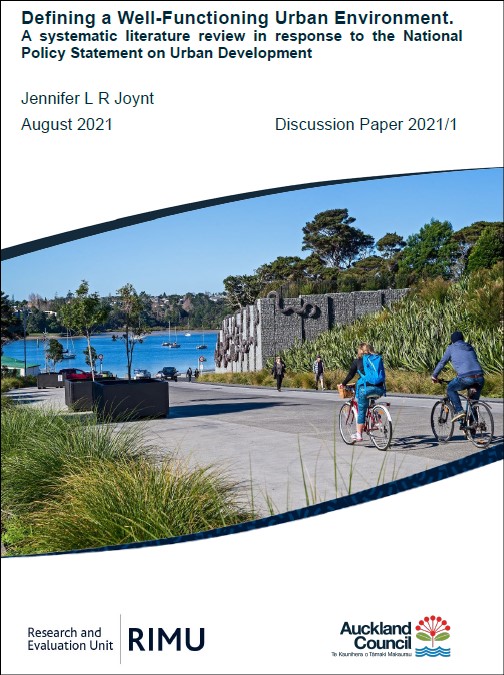Defining a well-functioning urban environment. A systematic literature review
Author:
Jennifer L R JoyntSource:
Auckland Council Research and Evaluation Unit, RIMUPublication date:
2021Topics:
EnvironmentExtract from the Executive summary:
This discussion paper forms part of the response to the requirements for tier 1 regional and territorial councils to implement the NPS-UD, as gazetted by the New Zealand Government in August 2020. Auckland Council has divided the response to the NPS-UD into a series of workstreams, with this literature review falling under workstream 1 (WKS1) – Well-functioning urban environments (WFUE).
The overall aim of WKS1 is to determine what is included in the definition of well-functioning urban environment, above the minimum, as set out in NPS-UD Policy 1.
Policy 1 of the NPS-UD describes a well-functioning environment as a planned environment that as a minimum have or enable a variety of homes that serve the following functions:
- meet the needs, in terms of type, price, and location, of different households
- enable Māori to express their cultural traditions and norms
- have or enable a variety of sites that are suitable for different business sectors in terms of location and site size
- have good accessibility for all people between housing, jobs, community services, natural spaces, and open spaces, including by way of public or active transport
- support, and limit as much as possible adverse impacts on, the competitive operation of land and development markets; and support reductions in greenhouse gas emissions
- are resilient to the likely current and future effects of climate change.
This discussion paper aims to test this definition for completeness using a systematic review of international academic and grey literature. The output of the review then recommends expanding the definition considering the findings. ...
Auckland Council discussion paper, DP2021/1
August 2021
